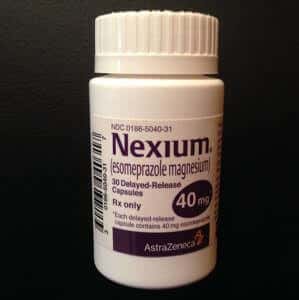
Whenever you decide to take a new medication, you should know what you will get out of it in terms of benefit and what side effects you might experience. This is especially important for drugs you will be taking for a long time. Unfortunately, doctors may not know a lot about long-term side effects when a medicine is new to the market. These come to light gradually. Could Nexium cause bone loss and nerve pain if taken for years?
Did Nexium Cause Bone Loss and Nerve Pain?
Q. I have been on Nexium for reflux practically forever. My gastroenterologist never monitored me for calcium, iron, magnesium, vitamin B12 or other deficiencies.
Over the last seven years I have slowly developed osteoporosis. The peripheral neuropathy in my legs is due to extremely low vitamin B12. I worry what other side effects this medication may cause me.
Taking Acid-Suppressing Drugs for Years Can Trigger Side Effects:
A. Long-term use of acid-suppressing drugs like esomeprazole (Nexium), lansoprazole (Prevacid) or omeprazole (Prilosec) has been linked to nutritional deficiencies, including vitamin B12 (American Journal of Gastroenterology, March, 2009, Suppl. 2). Low levels of this vitamin can lead to depression, confusion, poor muscle control and nerve damage that produces symptoms of numbness and tingling (peripheral neuropathy). This nerve pain may improve with vitamin B12 supplementation, but it doesn’t always respond to treatment.
People on long-term omeprazole or similar drugs might also be absorbing too little magnesium. In some cases, this could trigger heart rhythm abnormalities (Oxford Medical Case Reports, July 27, 2016).
Acid-Suppressing Drugs and Osteoporosis:
Does Nexium cause bone loss? An Australian study in elderly women found that those taking a proton pump inhibitor (PPI) such as Nexium or Aciphex were more susceptible to osteoporosis and fractures (Bone, Dec., 2015). Men are also more vulnerable to hip fracture when they are taking a PPI (Annals of Epidemiology, Apr., 2014).
It appears that heart patients taking esomeprazole, lansoprazole, omeprazole or pantoprazole along with the blood thinner clopidogrel (Plavix) are more likely to suffer cardiovascular complications (Journal of Cardiovascular Pharmacology and Therapeutics, online Aug. 10, 2016). Other studies have shown an increased risk of kidney problems or dementia.
You’ll learn more about the pros and cons of Nexium and other PPI drugs along with other alternatives for managing your reflux in our Guide to Digestive Disorders.

